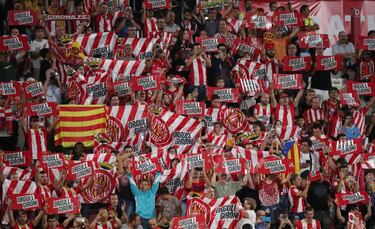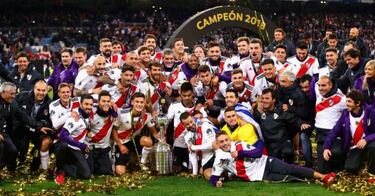What next for La Liga's plans for a game in Miami?
If Javier Tebas had got his way, Sunday's game between champions Barcelona and Girona would be taking place at the Hard Rock Stadium in Miami.

If La Liga had got its way, Sunday's derby between champions Barcelona and Girona would be taking place at the Hard Rock Stadium in Miami, with 65,000 stateside fans getting their first glimpse of Lionel Messi at close quarters.
The league's plans hit a wall of opposition, however, leading to Barca withdrawing from the game, which will instead take place at Girona's, 14,000-capacity Montilivi ground.
But Barca's withdrawal has not affected the league's appetite to take future games to the United States, its second biggest market for television rights.
"We respect the decision by Barcelona and will take the opportunity to work with all the parties involved to get everyone to understand the benefits of this proposal to plan a match stateside," Joris Evers, La Liga's head of communications, told Reuters.

"We will continue to make the argument and build the consensus, as we believe it makes sense for everyone involved."
The league's president Javier Tebas has revealed plans to apply to play a game in Miami next season and follow the NFL and NBA in staging regular season games abroad.
Reports in the Spanish media suggest the league would earn around 10 million euros ($11.38 million) from playing a game in Miami from ticket sales, television rights and merchandise.
In order to succeed where he failed last time, Tebas must convince a series of stakeholders who have either refused to back or have fiercely opposed the plans.
FIFA president Gianni Infantino said last year he would not authorise a league game outside of its traditional territory.

Spanish federation (RFEF) chief Luis Rubiales has been the loudest opponent of the league's ambitions, despite breaking with tradition last year by staging the single-match Spanish Super Cup in Morocco.
"The idea was not well thought out from the start, not because the league didn't consult the RFEF but because it acted without acknowledging the other parties that have vested interests in it," a federation source told Reuters.
"Surprise and anger"
David Aganzo, head of the Spanish footballers union (AFE), which last August threatened to strike if the idea was not shelved, also said he was bemused by the league's stance.
However, he did not rule out a league game happening abroad in the future.
"When we heard about it in the news our first reaction was surprise, then anger because they had not consulted the footballers," he said. For the game to happen, there would have to be a total consensus between all parties involved, beginning with the footballers."
The league's organising body, however, rejects the notion that other parties did not know about their plans.
"La Liga has been talking about playing a league match outside of Spain for nearly two years, suggesting this was a surprise move last August is bizarre," Evers said.
Related stories
The league also feels their plans have been helped by the success of last month's Copa Libertadores final between Boca Juniors and River Plate, which was controversially switched from Buenos Aires to Madrid due to fan violence.

"The fact that so many people welcomed this final to Spain showed that football is a global spectacle," Evers added. La Liga is a global spectacle too, so a La Liga game outside of Spain also makes sense."